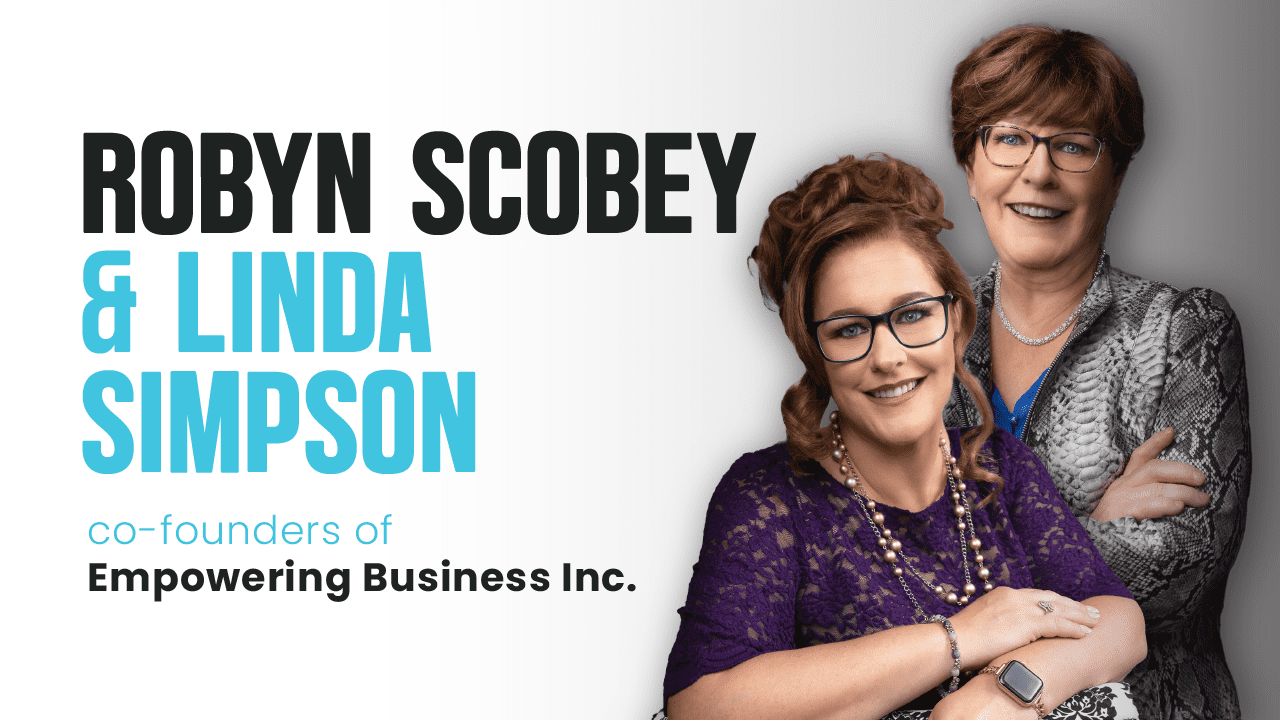For many entrepreneurs, running a business is an exhilarating journey—full of passion, late nights, and ambitious goals. But what happens when the numbers don’t add up? When payroll is due, cash flow is tight, and financial reports seem like a foreign language? That’s where Robyn Scobey and Linda Simpson step in.
As co-founders of Empowering Business Inc., Robyn and Linda have made it their mission to help small and medium-sized businesses understand their finances and turn struggling operations into profitable, well-oiled machines. Their expertise doesn’t just come from books—it comes from real-world experience, hard-learned lessons, and decades of running businesses themselves.
In an insightful conversation, they shared their entrepreneurial journey, the biggest financial mistakes business owners make, and the key strategies every entrepreneur should master to stay in control of their finances.
From Entrepreneurs to Educators
Robyn and Linda didn’t set out to become financial consultants. Their journey began when they ran a successful accounting practice. But after selling that business, they realized something troubling:
“So many small business owners had no idea how to read their profit and loss statements,” Robyn recalls. “They didn’t understand the difference between cash flow and profit—and that misunderstanding was killing their businesses.”
Recognizing this widespread gap in financial knowledge, they founded Empowering Business Inc. to teach entrepreneurs how to take control of their numbers. Unlike traditional accountants or fractional CFOs, Robyn and Linda don’t just provide reports—they educate and empower business owners to make informed decisions.
“We don’t want them to depend on us forever,” Linda explains. “We want them to have the skills to hire the right people or even handle their own financial oversight.”
The Three Financial Mistakes That Sink Businesses
According to Robyn and Linda, many entrepreneurs unknowingly sabotage their success by making three critical mistakes:
1. Confusing Profit with Cash Flow
One of the most dangerous misconceptions in business is that profit equals available cash. Linda and Robyn see this mistake all the time.
“Business owners look at a profit and loss statement from six months ago and think, ‘Great, we’re profitable!’” Linda says. “But then they check their bank account and wonder why they can’t make payroll.”
Profit is what’s left after expenses—but it doesn’t mean there’s actual money in the bank. Cash flow is the real indicator of business survival. Without cash on hand, businesses can’t pay suppliers, employees, or rent, even if they appear profitable on paper.
Key takeaway:
💡 Monitor cash flow weekly, not just monthly or quarterly. Have a system to track what’s coming in and going out, so you’re never caught off guard.
2. Ignoring Systems and Processes
Many entrepreneurs start their businesses with a “just get it done” mentality. While this works in the early stages, it quickly becomes a liability.
“If you don’t have written systems and processes, you’re setting yourself up for disaster,” Robyn warns. “Everything needs to be documented—from how invoices are handled to how a sale is closed.”
Without clear systems, businesses struggle to scale, employees make costly mistakes, and owners get stuck micromanaging instead of growing the business.
Key takeaway:
💡 Even if you’re a solo entrepreneur, start creating step-by-step guides for your tasks. These will be invaluable when you hire your first employee or need to delegate work.
3. Having No Exit Plan
Every business owner will eventually leave their business—whether by selling it, passing it on, or closing it down. But most don’t think about their exit strategy until it’s too late.
“Start five years before you plan to exit,” Linda advises. “Too many people assume they’ll just sell their business when they’re ready, but if it’s not financially structured correctly, no one will buy it.”
Robyn adds that business owners also need to consider personal factors. “I thought I’d be happy just staying home after selling my business—but no one tells you that all your friends will still be working! You need to plan for what comes next, both financially and personally.”
Key takeaway:
💡 Think ahead. Whether you plan to sell, retire, or hand your business down, put a structured exit strategy in place years in advance.
Beyond the Numbers: Building Strong Partnerships
Robyn and Linda aren’t just business partners—they’re family. Their ability to successfully balance a business partnership as mother and daughter offers valuable lessons for any entrepreneur considering working with a partner.
According to them, the secret to making a partnership work is clear roles, open communication, and accountability.
“We don’t treat each other as mother and daughter when we’re at work,” Robyn says. “If Linda says she’ll handle something and doesn’t, I hold her accountable—just like any business partner would.”
Linda agrees, adding that having an exit plan for the partnership is also crucial. “From the start, we knew what would happen if one of us wanted out. That prevents resentment and tough conversations later.”
Top Takeaways for Entrepreneurs
After working with countless businesses, Robyn and Linda have a few key pieces of advice for entrepreneurs looking to stay financially strong:
- Know your numbers. If you don’t understand your financial statements, you’re driving blind. Learn the basics or hire someone to teach you.
- Cash flow is king. Profit means nothing if you don’t have money in the bank. Monitor cash flow consistently.
- Systems and processes matter. They make your business scalable, reduce stress, and prevent costly mistakes.
- Plan your exit early. Whether you’re selling or stepping back, start structuring your exit strategy at least five years in advance.
- Build strong relationships. Business success isn’t just about money—it’s about people. Take care of employees, suppliers, and clients.
Robyn Scobey and Linda Simpson have turned their personal experiences into a powerful mission: helping entrepreneurs take control of their finances and build businesses that thrive.
Through Empowering Business Inc., they’re proving that understanding your numbers isn’t just for accountants—it’s the foundation of success.
For entrepreneurs struggling with cash flow, financial planning, or business structure, Robyn and Linda’s approach offers a lifeline—not just to survive, but to build a business that works for them, not the other way around.
Connect with Robyn Scobey on LinkedIn
Connect with Linda Simpson on LinkedIn
Connect with Empowering Business Inc. on LinkedIn

